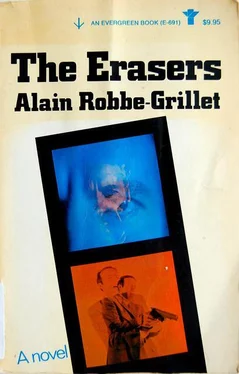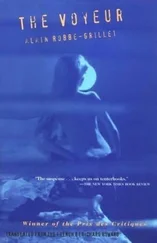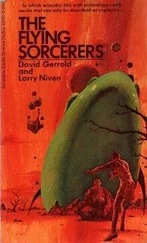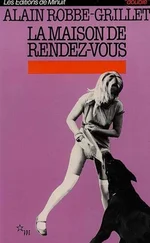Alain Robbe-Grillet - The Erasers
Здесь есть возможность читать онлайн «Alain Robbe-Grillet - The Erasers» весь текст электронной книги совершенно бесплатно (целиком полную версию без сокращений). В некоторых случаях можно слушать аудио, скачать через торрент в формате fb2 и присутствует краткое содержание. Жанр: Криминальный детектив, на английском языке. Описание произведения, (предисловие) а так же отзывы посетителей доступны на портале библиотеки ЛибКат.
- Название:The Erasers
- Автор:
- Жанр:
- Год:неизвестен
- ISBN:нет данных
- Рейтинг книги:4 / 5. Голосов: 1
-
Избранное:Добавить в избранное
- Отзывы:
-
Ваша оценка:
- 80
- 1
- 2
- 3
- 4
- 5
The Erasers: краткое содержание, описание и аннотация
Предлагаем к чтению аннотацию, описание, краткое содержание или предисловие (зависит от того, что написал сам автор книги «The Erasers»). Если вы не нашли необходимую информацию о книге — напишите в комментариях, мы постараемся отыскать её.
The Erasers — читать онлайн бесплатно полную книгу (весь текст) целиком
Ниже представлен текст книги, разбитый по страницам. Система сохранения места последней прочитанной страницы, позволяет с удобством читать онлайн бесплатно книгу «The Erasers», без необходимости каждый раз заново искать на чём Вы остановились. Поставьте закладку, и сможете в любой момент перейти на страницу, на которой закончили чтение.
Интервал:
Закладка:
The doctor was unable to tell him anything new. Wallas did not want to speak of the conspiracy, out of discretion, and Juard merely repeated what he had said that morning to the chief commissioner.
Quite naturally Wallas has taken, from the station square, the same streetcar as the evening before-the one that had taken him near the Rue des Arpenteurs. He got off at the same stop, and now follows the Boulevard Circulaire that brings him back to the little brick house and the wretched room over the Cafe des Allies. It is completely dark now. Wallas is no further along than when he arrived, the day before, by this same route.
He walks into the huge stone apartment building that stands at the corner of the street. He is going to be forced, for the counter-questioning of the concierge, to show his pink card and, most likely, to admit, at the same time, his little deception of this morning concerning his mother’s supposed friendship with Madame Bax.
From the greeting of the heavy-set, jovial man, Wallas sees that the latter recognizes him. When he reveals the object of his visit to him, the concierge smiles and merely says:
“I knew this morning that you were from the police.”
The man then explains that an inspector has already come by to question him, whom he has told that he knew nothing. Wallas then refers to the youth whose disturbing manners the concierge had mentioned. The other man raises his arms to heaven:
“Disturbing!” he repeats.
It had seemed to him, in fact, that the inspector was attaching to this young man an importance which he himself was far from…etc. Wallas discovers, as he expected, that Commissioner Laurent made no mistake in suspecting his subordinate of immoderate “zeal.” Hence the concierge did not say that there had been quarreling during these encounters, but only that at moments “voices were raised.” Nor did he say that the student often seemed to be drunk. Yes, he saw him point to the house as he walked by to a friend, but he did not say that his gesture was threatening; he only mentioned “sweeping gestures”-the kind all boys that age make, impassioned or nervous. Lastly the concierge adds that the professor had already received, in the past-though rarely, as a matter of fact-visits from students at the School of Law.
The cafe is warm and cheerful despite the heavy atmosphere-smoke, men’s breath, and the vapors of white wine. There are a good many people-five or six drinkers laughing and talking in loud voices, all at once. Wallas has returned to this place as to a refuge; he would like to have told someone to meet him here; he would wait for hours, lost in the noise of these trifling discussions-drinking hot rum at this rather isolated table…
“Greetings,” the drunk says.
“Hello.”
“You kept me waiting,” the drunk says.
Wallas turns around. Here, too, there is no isolated table where he can be quiet.
He has no desire to go upstairs to his room, which he remembers is gloomy and which is probably quite cold as well. He walks over to the bar, where three men are standing.
“Well,” the drunk shouts behind him, “aren’t you going to sit down over here?”
The three men turn around at the same time and stare at Wallas without the slightest embarrassment. One is wearing a grease-stained mechanic’s suit; the two others are in heavy navy blue pea jackets with big collars. It occurs to Wallas that his bourgeois clothes are betraying his profession. Fabius would have started by dressing up as a sailor.
…Fabius comes in. He is wearing a bargeman’s uniform and rolls his hips when he walks-the token of imaginary pitching on stormy seas.
“Not much to catch today,” he remarks to no one in particular. “Guess all the herring are already canned…”
The three men stare at him with surprise and suspicion. Two other customers, standing in front of the stove, have broken off a conversation-though one they were deeply involved in-to stare at him too. The manager wipes a rag across the bar.
“All right, are you coming?” the drunk repeats during the silence. “I’ll ask you the riddle.”
The two sailors, the mechanic, the other two men next to the stove all go back to their previous conversations.
“Give me a hot rum, please,” Wallas says to the manager.
And he goes to the first table and sits down, facing away from the drunk.
“Still polite as ever,” the latter observes.
“I could still,” someone says, “be walking obliquely to the canal and be walking in a straight line anyway.”
The manager serves the three men at the bar another round. The other two have resumed their argument; it is the meaning of the word oblique that is in dispute. Each man is trying to prove he is right by shouting louder than the other.
“Are you going to let me talk?”
“That’s all you do is talk!”
“You don’t understand: I said I can go straight ahead while still taking a direction that’s oblique-oblique in relation to the canal.”
The other man thinks a moment and remarks calmly:
“You’re going to fall into the canal.”
“Then you refuse to answer?”
“Listen, Antoine, you can say whatever you want, I’m not changing what I said: if you walk obliquely, you don’t go straight ahead! Even if it’s in relation to a canal or anything else.”
The man in the pharmacist’s gray smock and cap considers the argument he has just given an irrefutable one. His adversary shrugs in disgust:
“I’ve never met anyone so stupid in my life.”
He turns toward the sailors; but the latter are speaking among themselves, making exclamations in dialect and laughing loudly. Antoine comes over to the table where Wallas is drinking his hot rum; he calls on Wallas as his witness:
“You heard that, Monsieur? Here’s a supposedly educated man who doesn’t allow that a line can be both straight and oblique.”
“Oh.”
“Do you allow that?”
“No, I don’t,” Wallas quickly answers.
“What do you mean, you don’t? An oblique line is a line…”
“Yes, of course. I said I don’t allow that it isn’t allowed.”
“Oh, all right…fine.”
Antoine does not seem quite satisfied with this position, which he considers too subtle. All the same he shouts to his companion:
“You hear that, pillpusher?”
“I don’t hear anything,” the pharmacist answers.
“This gentleman agrees with me!”
“That’s not what he said.”
Antoine grows more and more exasperated.
“All right, explain to him what ‘oblique’ means, will you?” he asks Wallas.
“Oblique,” Wallas repeats evasively. “That can mean several things.”
“That’s my opinion too,” the pharmacist says approvingly.
“All right,” Antoine cries, at the end of his patience, “a line that’s oblique in relation to another line, that means something, doesn’t it?”
Wallas tries to formulate a precise answer:
“It means,” he says, “that they form an angle, an angle between zero and ninety degrees.”
The pharmacist chuckles.
“That’s what I said,” he concludes. “If there’s an angle, it isn’t straight.”
“I never met anyone so stupid in my life,” Antoine says.
“Well, I know one even better Listen to this…”
The drunk has stood up from his table to get into the conversation. Since it is difficult for him to stand, he immediately sits down again beside Wallas. He speaks slowly, so as not to get his words confused:
“Tell me what animal is a parricide in the morning…”
“That’s all we needed was this goon here,” Antoine objects. “You don’t even know what an oblique line is, I’ll bet…”
“You look pretty oblique to me,” the drunk says mildly. “I’m the one around here who asks riddles. I have one here just for my old pal…”
Читать дальшеИнтервал:
Закладка:
Похожие книги на «The Erasers»
Представляем Вашему вниманию похожие книги на «The Erasers» списком для выбора. Мы отобрали схожую по названию и смыслу литературу в надежде предоставить читателям больше вариантов отыскать новые, интересные, ещё непрочитанные произведения.
Обсуждение, отзывы о книге «The Erasers» и просто собственные мнения читателей. Оставьте ваши комментарии, напишите, что Вы думаете о произведении, его смысле или главных героях. Укажите что конкретно понравилось, а что нет, и почему Вы так считаете.












